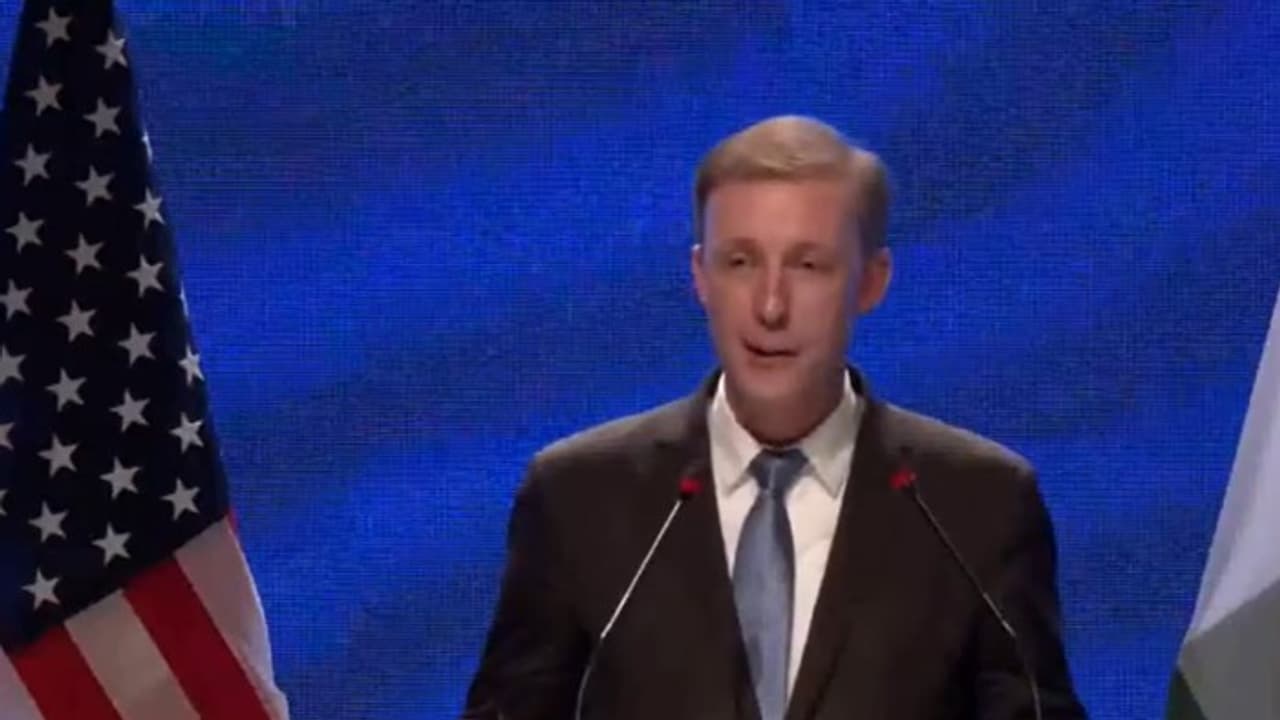US National Security Advisor Jake Sullivan announces the removal of regulations hindering civil nuclear cooperation between India and the US, marking a significant step in strengthening the bilateral partnership.
US National Security Advisor Jake Sullivan on Monday announced a major step forward in US-India civil nuclear cooperation, highlighting the Biden administration’s decision to remove long-standing regulations that have hindered collaboration between India’s leading nuclear entities and US companies. This move comes nearly 20 years after the initial vision for civil nuclear cooperation was laid out by former President George W. Bush and former Prime Minister Dr. Manmohan Singh.

In his address at the IIT-Delhi, Sullivan acknowledged the historical significance of the partnership, stating, “Although former President Bush and former Prime Minister Dr. Manmohan Singh laid out a vision of civil nuclear cooperation nearly 20 years ago, we have yet to fully realize it.”
He emphasized that while significant strides have been made, the potential for collaboration in clean energy technologies, artificial intelligence, and energy innovation remains untapped.
"As we work to build clean energy technologies to enable growth in artificial intelligence, and to help US and Indian energy companies unlock their innovation potential, the Biden administration has determined that it is past time to take the next major step in cementing this partnership," he said.
Sullivan further stated that the US is in the final stages of removing the regulatory barriers that have historically restricted the ability of Indian nuclear entities to collaborate with American companies.
"So today I can announce that the United States is now finalizing the necessary steps to remove long-standing regulations that have prevented civil nuclear cooperation between India's leading nuclear entities and US Companies. The formal paperwork will be done soon but this will be an opportunity to turn the page on some of the frictions of the past and create opportunities for entities that have been on restricted lists in the United States to come off those lists and enter into deep collaboration with the United States, with our private sector, scientists and technologists to move civil nuclear cooperation forward together," the US NSA said.
Earlier today, External Affairs Minister S. Jaishankar met with US National Security Advisor Jake Sullivan, reviewing the progress of the India-US global strategic partnership over the past four years under the Biden administration. Sullivan’s visit to India comes just two weeks ahead of Donald Trump's inauguration as the 47th president of the United States.
In a post on X, Jaishankar expressed his appreciation for Sullivan's "personal contribution" to deepening the bilateral relationship, noting the strengthening of the India-US partnership. Jaishankar highlighted the successful launch of the US-India Initiative on Critical and Emerging Technology (iCET) as one of the most significant measures aimed at expanding ties between the two nations. The iCET, which was launched in May 2022 by Prime Minister Narendra Modi and US President Joe Biden, focuses on fostering collaboration in critical technologies such as artificial intelligence, semiconductors, biotechnology, and defense innovation.
Sullivan, during his visit, also held talks with Indian National Security Advisor Ajit Doval to review the progress of cooperation under iCET, along with discussions on bilateral defense engagement. Over the past year, both sides unveiled a series of transformative initiatives, particularly in the fields of semiconductors, critical minerals, advanced telecommunications, and defense space.
"This is likely the last trip overseas that I will lead as NSA and I cannot think of a better way to end my tenure in the White House, visiting India on my final overseas trip to mark the advances that we have made together over the past four years. This is a shared and historic achievement. I have every reason to believe that within the next decade, we will see American and Indian firms working together to build the next generation of semiconductor technologies, American and Indian astronauts conducting cutting-edge research and space exploration together," Sullivan said during his address.
Defense cooperation between the two countries has seen significant growth in the last four years, highlighted by India's recent $4 billion deal to purchase 31 Predator long-endurance drones from General Atomics under the foreign military sales route. This deal aims to bolster India’s defense capabilities, especially along its contested borders with China. The deal includes 15 Sea Guardian drones for the Indian Navy, along with eight Sky Guardian drones each for the Indian Air Force and the Army. These high-altitude drones are capable of staying airborne for over 35 hours and can carry up to four Hellfire missiles and 450 kg of bombs.
